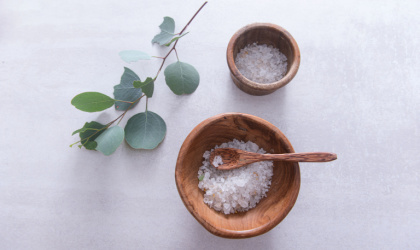
Living with physical discomfort poses many challenges. Fortunately, there are plenty of ways to improve your situation. Doing an inventory of your diet and lifestyle choices is a great place to start. Looking into what you eat and how you choose to live your life is an essential part of any approach to manage symptoms.
Eat more wholefoods
Eating a mainly whole-food diet is one of the best ways to support your health and manage physical discomfort. Highly processed, overly-greasy, ultra-refined foods can trigger imbalances in the body, which are often associated with symptoms of discomfort. Try to live by this rule: if it grows, eat it; if it doesn’t, think twice before putting it in your shopping basket.
Go with your gut
Your gut impacts far more than just your digestive system. It’s an extraordinary entity that affects everything from mood and immunity to cardiovascular health and cognition. And now, research suggests the gut microbiome may also influence physical discomfort (1). Thanks to a little thing called the ‘gut-brain-axis’, a healthy gut means a healthy brain. And since the brain generates feelings of discomfort, looking after your gut becomes even more essential.
There are plenty of ways to support your gut health, including:
-
Aim for 30 grams of fibre each day (most people only get 17 grams!)
-
Eat the three k’s: kefir, kombucha, and kimchi
-
Consider time-restricted feeding (eating your food in an 8-12-hour window)
-
Get 7-9 hours of sleep every night
Increase your intake of plants
Embracing a plant-focused diet may also support physical discomfort (2). This approach is believed to reduce symptoms in two ways: firstly, a plant-based diet eliminates animal-based products, like butter, cheese, and milk, which contain saturated fats that may contribute to imbalances in the body and lead to discomfort. Secondly, plant foods are full of antioxidants and phytochemicals, which are known to support good overall health.
Spice it up
Practitioners of Ayurveda medicine have long recognised the importance of herbs and spices to support the reduction of physical discomfort. Turmeric, ginger, cinnamon, and garlic come highly recommended, so try to use them liberally in cooking.
Go easy on the alcohol
Many people turn to alcohol to cope with physical and emotional discomfort. But, in most instances, drinking can make it worse (3). If you’re using alcohol to help manage symptoms, consider finding other ways to navigate them, such as using relaxation techniques, spending time in nature, and exercising – all of which support your wellbeing and serve as great distractions from discomfort.
Rethink your smoking habit
Like alcohol, smoking can provide short-term relief from physical discomfort. But it can cause problems in the long run. Nicotine, the addictive substance in cigarette smoke, narrows blood vessels, reducing blood flow to the organs, bones, and muscles, often exacerbating physical discomfort (4). Quitting smoking is hard, but there’s plenty of help available. You can find lots of resources on the NHS website.
Supplement support for physical discomfort
Besides making changes to your diet and lifestyle, you may wish to consider the following supplement to help manage discomfort.
Magnesium
Magnesium is an essential mineral that plays an integral role in many body processes. It’s often recommended by nutritionists since it contributes to the maintenance of normal muscle function.PEA
PEA belongs to a group of natural compounds which are vital for chemical signalling in the body, and it can be found in almost every cell in the body. It is naturally produced when cells are damaged or threatened. It’s a popular choice to tackle those niggles that might hold you back.
Vitamin D3
Vitamin D3 is essential for muscle and bone function, making it a popular choice.
Devil’s Claw
Devil's Claw is a traditional herbal medicinal product used for the relief of backache, rheumatic or muscular pain, and general aches and pains in the muscles and joints.
Glucosamine & Chondroitin
The combination of glucosamine and chondroitin has become one of the most popular supplements with millions of people choosing to take it on a regular basis. Many people choose to take it alongside Devil’s Claw.
Turmeric
Turmeric has a long history of use in health and wellness. Curcumin, the natural compound found in turmeric, is said to be responsible for the spice’s properties.
Omega-3s
Found in oily fish and microalgae, the long-chain omega-3 fatty acids are important for good overall health. Omega-3s are often recommended as a perfect partner to Devil’s Claw.
Rosehip
Regarded as a 'super-fruit' by herbalists, rosehip is a popular choice for those who take Glucosamine or Devil’s Claw.
Want to find out more?
Read more of our resources on managing physical discomfort here. You can also reach out to our expert Nutrition Advice team to receive free nutrition advice. No matter how small your query, they’re happy to help.
Call: 01892 352927
Email: nutrition@naturesbest.co.uk
Write: Nature’s Best Ltd. Century Place, Tunbridge Wells, Kent, TN2 3BE
References:
-
Available online: https://pubmed.ncbi.nlm.nih.gov/31551115/
-
Available online: https://pubmed.ncbi.nlm.nih.gov/30219471/
-
Available online: https://www.jpain.org/article/S1526-5900(16)30334-0/fulltext
-
Available online: https://www.ncbi.nlm.nih.gov/pmc/articles/PMC6768701
Related Posts

Olivia
Olivia Salter has always been an avid health nut. After graduating from the University of Bristol, she began working for a nutritional consultancy where she discovered her passion for all things wellness-related. There, she executed much of the company’s content marketing strategy and found her niche in health writing, publishing articles in Women’s Health, Mind Body Green, Thrive and Psychologies.
View More



